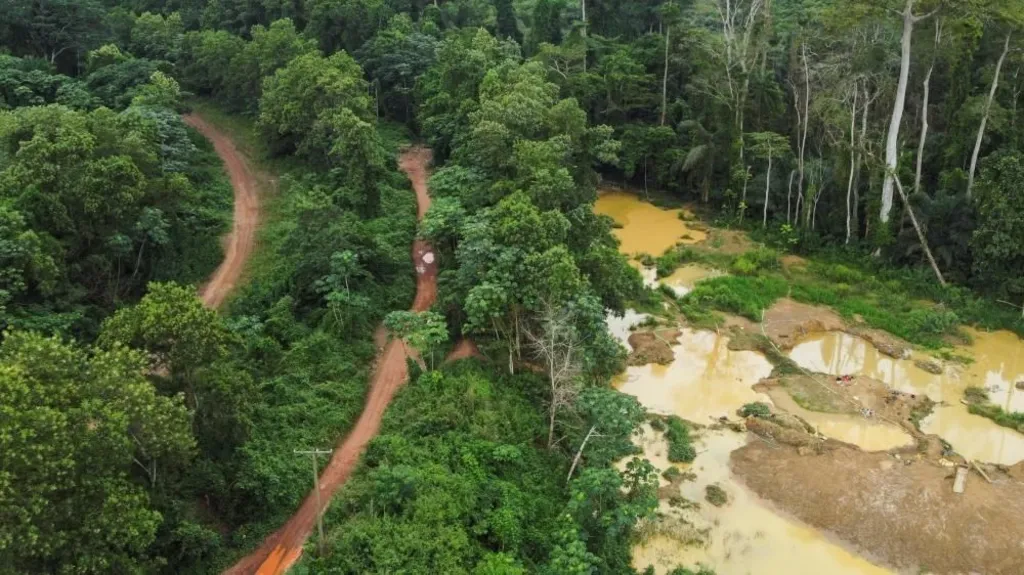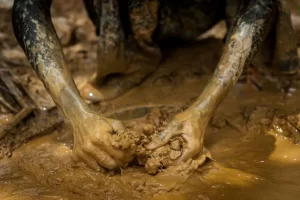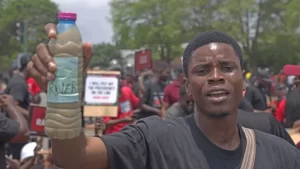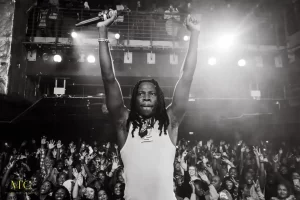“Environmental Crisis Unfolds as Ghana’s Gold Rush Pollutes Land and Water”
3 min read
The state water utility has warned that pollution could force Ghana to import water

The state water utility has warned that pollution could force Ghana to import water
In Ghana, the environmental toll of illegal gold mining has reached alarming levels, prompting artists and activists to take a stand. One artist, Israel Derrick Apeti, known as Enil Art, recently highlighted the dire situation by using water from the polluted Pra River to create paintings. This river, located about 200 kilometers west of Accra, is heavily contaminated due to rampant gold mining activities that have become a significant environmental crisis.
Illegal gold mining, locally termed “galamsey,” has spread extensively across Ghana, leading to severe degradation of land and pollution of waterways. The use of mercury in the extraction process has worsened the situation, with charities like WaterAid labeling it “ecocide.” Apeti described the river’s water as so thick and discolored that it was usable as paint, showcasing the urgent need for action against the ecological disaster unfolding in the country.
Ghana is the world’s sixth-largest gold exporter and the second-largest cocoa producer. However, the combination of illegal mining and environmental destruction poses a serious threat to these vital industries. Demonstrations in Accra recently called on the government to address the rampant illegal mining, but police responded by detaining dozens of protesters, igniting further outrage.

The hashtags #stopgalamseynow and #freethecitizens began trending, mobilizing young people in Ghana and the diaspora, particularly in Canada and the UK. Apeti emphasized the role of art in activism, expressing his determination to use his skills to raise awareness of the environmental degradation caused by galamsey.
Communities along the Pra River, which once teemed with fish and wildlife, now lament its transformation into a yellowish-brown waterway. Popular Ghanaian musicians have joined the campaign, with artists like Black Sherif and Stonebwoy addressing the crisis in their performances, underscoring the widespread concern about the devastation wrought by illegal mining.
The nature of illegal mining in Ghana has changed drastically. Initially, young men worked with simple tools, but over the past two decades, Chinese investors have transformed the industry into a more industrialized operation, often neglecting environmental standards. This “mad gold rush” has led to the destruction of cocoa farms and the illegal acquisition of land for mining.

Reports indicate that approximately 4,726 hectares of land—an area larger than several European cities—have been ravaged, with significant impacts on Ghana’s forests. Dr. John Manful, an agricultural consultant, highlighted the catastrophic effects on agriculture, stating that “precious, valuable land” has been lost due to gold-seeking activities.
The illegal mining process involves the extensive use of chemicals like mercury and cyanide, which pollute rivers and affect entire ecosystems. Dr. George Manful, a former official with Ghana’s Environmental Protection Agency, warned that mercury can linger in waterways for centuries, poisoning the food chain and making the water undrinkable.
WaterAid has called for immediate government action to halt this ecocide, cautioning that Ghana could become an importer of water by 2030 if the situation is not addressed. Although the government has prosecuted numerous individuals for illegal mining, the problem persists, largely due to the influence of powerful individuals profiting from the chaos.
The gold rush is exacerbated by Ghana’s ongoing economic crisis, which has left many jobless and desperate for income. As a result, illegal mining has become an attractive option, with miners earning significant sums in a country where formal employment opportunities are dwindling. Apeti noted that despite government raids on illegal mining operations, miners often return under the cover of darkness, undeterred.

In response to the crisis, President Nana Akufo-Addo ordered the deployment of naval vessels to halt mining activities around vulnerable water bodies. However, some members of the ruling New Patriotic Party express skepticism about a serious crackdown, fearing that it may alienate their voter base in mining districts.
A survey by WaterAid revealed that more than 75% of those involved in illegal mining see it as a profitable venture, even as 97% acknowledge its environmental harm. Alarmingly, 79% reported health issues linked to their mining activities.
When President Akufo-Addo took office in 2017, he vowed to tackle illegal mining and restore Ghana’s natural resources. However, critics argue that his administration has failed to fulfill these promises, allowing the crisis to worsen and jeopardizing the nation’s future. The combination of environmental degradation and economic challenges presents a complex problem that Ghana must address to secure a sustainable future.